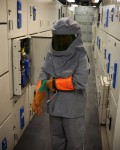 The main hazard: electricity is difficult to assess because you cannot directly see it. The only way to identify electricity’s presence is to properly use the right tools; a meter, or proximity detector. Only qualified persons should work directly with electricity. Even working indirectly with electricity, or around electrical systems requires you to be competent.
The main hazard: electricity is difficult to assess because you cannot directly see it. The only way to identify electricity’s presence is to properly use the right tools; a meter, or proximity detector. Only qualified persons should work directly with electricity. Even working indirectly with electricity, or around electrical systems requires you to be competent.
Do you have the skills and abilities to work around electricity? What about directly? So, what does OSHA say?
Qualified Person – One who by possession of a recognized degree, certificate, or professional standing, or who by extensive knowledge, training and experience, has successfully demonstrated his ability to solve or resolve problems relating to the subject matter, the work, or the project. Electricians, Engineers, and other highly trained professionals who specifically work on electrical are qualified persons.
Competent Person – One who is capable of identifying existing and predictable hazards in the surroundings or working conditions, which are unsanitary, hazardous, or dangerous to employees, and who has authorization to take prompt corrective measures to eliminate them.
Competency and training are only part of the safety formula when it comes to working on and around electricity. Your knowledge is only good if you put it into practice. Remember to use proper PPE, use proper tools, and use Lockout and Tagout procedures at all times.
Electrical Engineers and Design Professionals
Electrical design professionals work together with electricians to provide a safe environment for your family and business.
Design professionals apply their awareness of industry standards, equipment ratings, legal requirements, and end-user needs to design an electrical power system while electricians use their experience with electrical systems and building systems, construction methods and procedures, and training to construct the electrical systems envisioned by the design professional.
Engineers are taught operational theory of various electrical systems-components while electricians are taught to use a variety of tools to construct and maintain the electrical systems.
Understanding systems and components help engineers determine potential causes for a system failure while electricians use their experience in construction to locate and fix the problem with the proper tools.
Inspections and analysis of systems and components ensure the equipment continues to function properly and safely.
